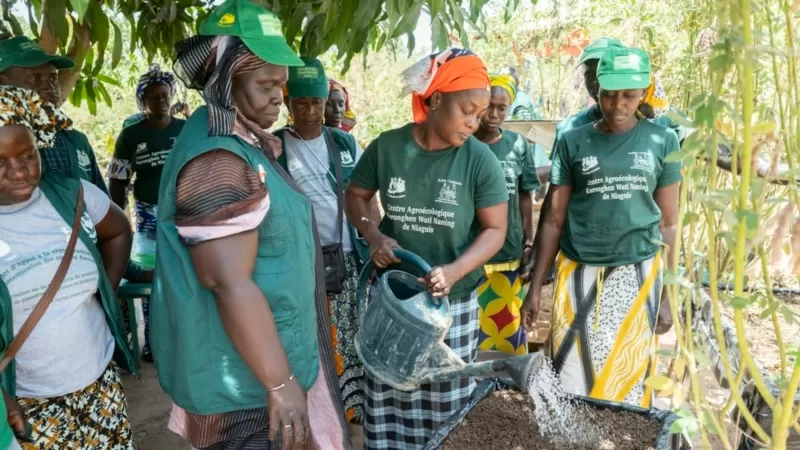Ziguinchor, Senegal – Mariama Sonko’s powerful voice echoed through the circle of 40 women farmers, sitting in the shade of a cashew tree. As they scribbled notes, their brows furrowed in concentration, the thud of falling fruit punctuated Sonko’s lecture.
This quiet village in Senegal is the headquarters of a remarkable rural women’s rights movement in West Africa – We Are the Solution. Sonko, its president, is on a mission to train and empower female farmers from cultures where women are often excluded from owning the land they work so tirelessly.
In Senegal, women make up 70% of the agricultural workforce and produce 80% of the crops, yet they have limited access to land, education, and finance compared to men, according to the United Nations. Sonko asks, “We work from dawn until dusk, but with all that we do, what do we get out of it?”
She firmly believes that when rural women are given land, responsibilities, and resources, it has a ripple effect through communities. Her movement is training women farmers who traditionally have no access to education, explaining their rights, and financing women-led agricultural projects.
Across West Africa, women are usually not allowed to own land because it is expected that when they marry, they leave their community. However, when they move to their husband’s home, they are not given land because they are not related by blood.
Sonko grew up watching her mother struggle after her father passed away, leaving her with young children to support. She reflects, “If she had land, she could have supported us.” Instead, Sonko had to marry at a young age, abandon her studies, and leave her ancestral home.
After moving to her husband’s town at the age of 19, Sonko and several other women convinced a landowner to rent them a small plot of land in exchange for a portion of their harvest. They planted fruit trees and started a market garden. However, five years later, when the trees were full of papayas and grapefruits, the owner kicked them off.
This experience left a lasting impact on Sonko. She says, “It made me fight so that women can have the space to thrive and manage their rights.” When she later got a job with a women’s charity funded by Catholic Relief Services, coordinating micro-loans for rural women, her work began.
Laure Tall, research director at Agricultural and Rural Prospect Initiative, a Senegalese rural think tank, says, “Women farmers are invisible.” This is despite the fact that women work on farms two to four hours longer than men on an average day.
But when women earn money, they reinvest it in their community, health, and children’s education, says Tall. On the other hand, men may spend some on household expenses but can choose to spend the rest as they please. Sonko lists common examples like finding a new wife, drinking, and buying fertilizer and pesticides for crops that make money instead of providing food.
With encouragement from her late husband, Sonko chose to invest in other women. Her training center now employs more than 20 people, with support from small philanthropic organizations such as Agroecology Fund and CLIMA Fund.
In a recent week, Sonko and her team trained over 100 women from three countries – Senegal, Guinea-Bissau, and Gambia – in agroforestry, which involves growing trees and crops together as a measure of protection from extreme weather, and micro gardening, which focuses on growing food in tiny spaces when there is little access to land.
One of Sonko’s trainees, Binta Diatta, shares her experience with We Are the Solution. She says, “They bought irrigation equipment, seeds, and fencing – an investment of $4,000 – and helped the women of my town access land for a market garden, one of more than 50 financed by the organization.”
When Diatta started earning money, she spent it on food, clothes, and her children’s schooling. Her efforts did not go unnoticed. She says, “Next season, all the men accompanied us to the market garden because they saw its value.” This was a significant change from before when men did not involve themselves in the women’s work.
Now, another challenge has emerged, affecting women and men alike – climate change. According to the Intergovernmental Panel on Climate Change


